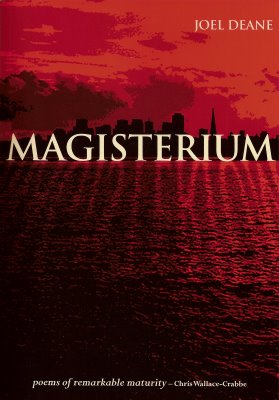 Magisterium by Joel Deane
Magisterium by Joel Deane
Australian Scholarly Publishing, 2008
Magisterium is the second collection by Joel Deane, following on from his debut collection Subterranean Radio Songs and his debut novel Another. In an interview with Paul Mitchell published in Cordite in 2006, when asked about the interplay between his work as speechwriter for the Premier of Victoria and his other life as a poet, Deane cited American poet Eleanor Wilner, who said of poets that, 'We need to take back the rhetorical high ground from the politicians who degrade it'. Deane went on express the hope that the poems contained in his next book might approach 'the kind of apocalyptic public language' hinted at by Wilner. Such ambitions can sound a little lofty, but Magisterium would seem to be a successful achievement of that goal.
'Apocalyptic' is actually an apt way to describe this collection. Magisterium reads like a series of admonitions. Were these poems to be read aloud, the delivery that would suit them best would be a low, angry growl. They paint a picture of a cruel, violent and cynical world and its inhabitants, who are both the victims and the perpetrators of this cruelty. Deane's poems are preoccupied with the dark side of morality, the ethical failures and moral lapses that are all too familiar. Murder, betrayal and self-interest all feature heavily.
In keeping with these imposing subject matters, Deane's language aims for a matching gravitas. Throwing so many complex words and weighty concepts around so boldly can run the risk, especially for a poem, of becoming melodramatic and parodic. There's something in Deane's execution, however, that allows the best of his poems to transcend the adolescent feel that poems about death, despair and the meaning of life often have.
Admittedly, sometimes Deane does go a little far with his language, and strays into the purple, as in 'Rhetorica' – 'The hieroglyphics of slaughter:/An ideographic of evisceration without a Rosetta' – or in 'Dearly Beloved':
For there is magnificence
in our dissonance
A disharmonic opera
of percussive rage
Even then, however, there is something to admire about the ambition of such poems.
It all comes down to the confidence with which Deane executes his task. To take on such big topics could be brave or foolish, but whether it's one or the other, Deane keeps an even keel. He knows what he wants to say and he says it with a steady voice and a mesmerising approach. You might not agree with his point, or his worldview, but something about these poems makes you respect them all the same.
With so much weight given to human failure, indifferent suffering and death, Magisterium could have been excessively angst-ridden and pompous, but it isn't. There's enough humanity in Deane's poems about relationships, family and contemporary politics to counterpoint the weight of his widescreen moments and make the collection less like a sermon and more like a conversation.
Deane's poems are at their most accessible – without sacrificing any of their tautness – when the subjects they concern are more personal and less theoretical; when they are about specific incidents rather than general points of view. 'Cronulla Postcards', about the race riots in Sydney in 2006, is one such poem:
Breakers loiter offshore onshore
a mob rampages
between the flags.
'Driving My Mother's Car' is another:
Did not expect it
to smell like this.Unfamiliar.
Not old. Not new.
There are also moments – admittedly not that many – in which Deane lets a little light shine through to provide a contrast to the darkness and lighten the load of an undeniably heavy book. He allows for the possibility of love and joy among the terror and confusion in a smattering of love poems such as 'Call This Happiness', in which 'the black dog of unending night/ends'.
There is optimism also in 'The Seasoned Shepherd to His Love', in which love is posited as a panacea for environmental degradations. As Deane notes in 'Requiem', life may well be a long slow fuck, a slow-motion car crash off a cliff into a barbed-wire fence, but even so 'we love this life we are leaving/and are unafraid of the next'.
It is true that even these (comparatively) lighter moments in Magisterium are tinged with despair, but their bittersweet flavour still helps to cut through the potentially overwhelming taste of doom and gloom.
This is not a cheery book. This is not poetry as a celebration. But despite this, Deane never feels maudlin. It never feels like he wants us to give up or to lie down and die. Like the sermons his poetry emulates, his poems are examples held up to us to make us think, to show us the things that make us uncomfortable and to provoke us into considering how different life could be.









